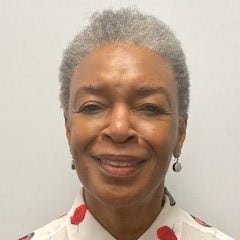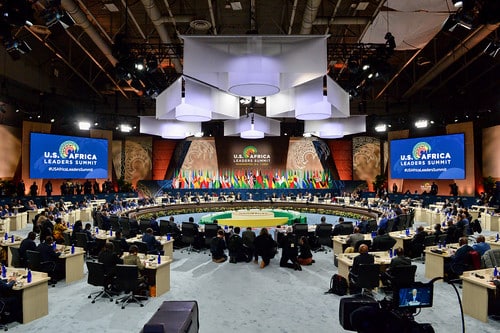Africa shone in Washington this past week, as the US wooed African heads of state at the US-Africa Leaders Summit underlining the continent’s significance and committing to invest in its future with renewed vigor. What’s next? More in this exclusive FORBES AFRICA interview.
The United States demonstrated the big Africa push with commitments to support Africa’s inclusive growth at the US-Africa Leaders Summit held last week in Washington DC.
At the US-Africa Business Forum, President Joe Biden said the US is “all in on Africa’s future” and called it “another historic summit”. As many as 49 African heads of state attended and business deals worth a reported $15 billion were signed during the forum.
The last time this summit was held was eight years ago under the Obama-Biden administration.
The Biden-Harris administration now plans to invest at least $55 billion in Africa over the next three years, and is recasting traditional US policy priorities.
After signing a Memorandum of Understanding on Cooperation for Trade and Investment between the US and the African Continental Free Trade Area (AfCFTA) with the Secretary General of the AfCFTA Secretariat, Wamkele Mene, during the US-Africa Business Forum, US Trade Representative, Ambassador Katherine Tai, said: “The future is Africa – for the United States and global economy. Africa’s significance is undeniable… The Biden-Harris administration recognizes that it is impossible to meet today’s challenges on trade without African contributions and leadership, and our support of the AfCFTA is part and parcel of this…
“But our work together will be an inclusive undertaking, requiring active participation from African Union member states, Regional Economic Communities, diaspora, SMEs, women-owned businesses, young entrepreneurs, workers and civil society groups.”
More from an interview during the December 13-15 summit with Constance Hamilton, the Assistant US Trade Representative for Africa, Office of the United States Trade Representative, who also oversees the administration’s implementation of the African Growth and Opportunity Act (AGOA):

Q. It’s Africa in the United States, with heads of state visiting from the continent. What is the sentiment you’re seeing right now about Africa?
A. There’s just a lot of optimism about the relationship, that we all have an interest in finding common ground so we can work better together [on] all the major issues facing not just Africa and the United States, but the world; everything from climate change to the war with Ukraine to all issues. I think that what this [summit] does is it brings together like-minded people to try to find solutions to some of the major problems in the world today. And so it’s a very good vibe right now. We had a big meeting to talk about the African Growth and Opportunity Act, they had an opportunity to engage with congressional members… both sides offered their views on what should happen, what’s worked, what didn’t work well in the program, and changes that they may want to think about going forward… it’s a lot of goodwill. I hope one of the things this meeting does is reinforce the importance of Africa to America. I think that’s a very good thing.
Q. It’s good to see the narrative shifting, because we always hear about Africa needing aid, but people not really talking about working together with Africa. Do you see big collaborations coming together?
A. Absolutely. I mean, even countries that are facing challenges, as Ambassador Tai has articulated many, many times is that we do believe in growth from the bottom up, so that [for] those who are marginalized, those who are not seeing any benefits and trade, that we come up with policies and plans to make sure that they do, that they are part of the success story. There are a lot of conversations about how we work together both as a group, and individually in each of the countries we talk to; how do we work together to do better.
Q. There are smaller countries that don’t receive the kind of attention from the world that the bigger economies perhaps receive, and they have their peace and security issues and are conflict-ridden. How you engaging specifically with some of the smaller emerging markets on the continent?
A. One thing I would say about that is the way my office is structured, every country, whether they’re big or small, is important to what we’re doing. So whether you’re a tiny island nation, whether you’re Nigeria or South Africa, we pay attention to you… we pay attention to all the criteria, we look at each country to make sure that they are meeting the criteria. And we get very specific. So when there are challenges, we reach out to find out where we can find the assistance to help them address some of their problems. We use USAID and some of the other agencies within the US government to make sure that we can identify resources that we can point in their direction. So it’s not just about providing aid, it’s also providing assistance for them to do what they want to do.
Q. With the AfCFTA aiming for a single market, how are you capitalizing on that opportunity?
A. One of the things that happened at this meeting, was Ambassador Tai and Secretary-General Mene from the AfCFTA Secretariat find a memorandum of understanding, laying out a plan for us to work with the African Union Secretariat, to help them implement and negotiate new protocols on the AfCFTA. We definitely want to be a partner in that, we see the importance of it; we’ve been supporting regional integration on the continent for decades. So we know the importance of this. We also understand the challenge. I mean, you think about 55 nations, we know that the borders are thick, you know that it’s difficult for goods to move, we know that there’s some transportation and trade facilitation issues. This is an opportunity to work with the Secretariat and with the members to figure out a path forward.
Q. Moving to Africa’s greater integration into the global economy, what does the world think of Africa’s investment climate at the moment? How are you mobilizing the power of the business community there to invest into Africa?
A. I think that where Africa and African nations can really benefit from this whole move towards globalization is by getting into value and supply chains, where they have strength to do that. I think that’s one of the things when we talk about the AfCFTA, when we talk about AGOA, when we talk to countries about improving their investment climate so that investors aren’t just interested and taking out raw materials, they’re interested in joint ventures or putting up manufacturing facilities… I do think that there is, especially with AGOA, that allows countries from other partners to produce manufactured goods. I think that there’s a way forward on that. One of the issues we’ll be looking at is how to bring African countries more into value and supply chain.
Q. What about catalyzing private sector partnerships?
A. It’s always a part of what we’re trying to do, part of the AGOA forum that we’ll have in South Africa in 2023. We hope to bring a large US private sector contingent so they can see what Africa offers. And they can also talk about joint ventures and other investment opportunities. That’s always part of our idea. The governments can’t do it, trade happens from private sectors. And so getting our companies, our SMEs, our women or youth-oriented enterprises to come to Africa, and see what they can do. That’s part of what we hope to encourage.
Q. This is a continent with countries that lack basic services such as power, health equity, food security, rule of law or democratic reforms. How are you going to accelerate progress in all of those areas?
A. It’s a big continent with a lot of countries, and each one has different issues. They don’t all have the same challenges. I think the key is to find out what are the challenges in a particular country and identify what we can do to assist. If they’re part of the AGOA family, that gives them a leg up, because there are things that we’re already doing to help them trade. If they’re not part of the AGOA family, we still care about their development, even when we take a country out of AGOA, part of the work is how do we get them back in? There are a lot of challenges on the continent, there are a lot of challenges in America, but these are all things I think that can be solved by working together.
Q. With the growing youth population on the continent, how are you engaging with these young minds, innovators and entrepreneurs in the startups ecosystem?
A. We know that a lot of the innovation in digital trade is coming from young people. But it’s not just the youth, it’s also women. When we had the African Women Entrepreneurship Program, which was a big part of AGOA, and I thought that this was one of the most exciting elements of what AGOA brought to the table because it allows these women to form their own chapters in the countries, and they help each other find employment opportunities or help their companies grow. And I think that the Young African Leaders Initiative (YALI) that started under President Barack Obama is also a way of identifying really bright, enterprising young people, and helping them get to where they want to go in terms of business. So I think there’s a lot that we’re doing already that supports not just women, but also youth. It’s hard for me to articulate all of the different initiatives that are out there, but I do think that there’s a lot that we’re doing to try to bring them into businesses so that they can follow their dreams.
It’s really important to have this kind of dialogue and meet face-to-face [at the summit]; it’s very important for relationships. I think that it’s a fantastic vibe. Next year, we hope to be in South Africa for an AGOA forum after [South Africa’s Minister of Trade and Industry] Ebrahim Patel said he’s looking forward to hosting everyone, and I’m looking forward to being there.
